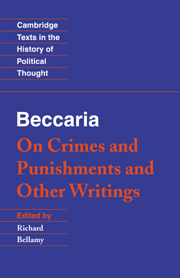Book contents
- Frontmatter
- Contents
- Acknowledgements
- Introduction
- Chronology
- Biographical glossary
- Note on the texts
- Bibliographical note
- On Crimes and Punishments
- Frontispiece
- To the Reader
- Introduction
- 1 The origin of punishment
- 2 The right to punish
- 3 Consequences
- 4 The interpretation of the laws
- 5 The obscurity of the laws
- 6 The proportion between crimes and punishments
- 7 Errors in the measuring of punishments
- 8 The classification of crimes
- 9 Of honour
- 10 Of duels
- 11 Public peace
- 12 The purpose of punishment
- 13 Of witnesses
- 14 Evidence and forms of judgement
- 15 Secret denunciations
- 16 Of torture
- 17 Of the exchequer
- 18 Of oaths
- 19 Of prompt punishments
- 20 Violent crimes
- 21 The punishment of the nobility
- 22 Theft
- 23 Public disgrace
- 24 Parasites
- 25 Banishment and confiscations
- 26 Family feeling
- 27 Lenience in punishing
- 28 The death penalty
- 29 Of detention awaiting trial
- 30 Trials and prescriptions
- 31 Crimes difficult to prove
- 32 Suicide
- 33 Smuggling
- 34 Of debtors
- 35 Asylums
- 36 On setting a price on men's heads
- 37 Attempted crimes, accomplices and immunity
- 38 Leading interrogations, depositions
- 39 Of a particular kind of crime
- 40 False ideas of utility
- 41 How to prevent crimes
- 42 The sciences
- 43 Magistrates
- 44 Public awards
- 45 Education
- 46 Pardons
- 47 Conclusion
- To Jean Baptiste d'Alembert
- To André Morellet
- Inaugural Lecture
- Reflections on the Barbarousness and the Civilisation of Nations and on the Savage State of Man
- Reflections on Manners and Customs
- On Luxury
- Index
- Cambridge Texts in the History of Political Thought
30 - Trials and prescriptions
Published online by Cambridge University Press: 05 June 2012
- Frontmatter
- Contents
- Acknowledgements
- Introduction
- Chronology
- Biographical glossary
- Note on the texts
- Bibliographical note
- On Crimes and Punishments
- Frontispiece
- To the Reader
- Introduction
- 1 The origin of punishment
- 2 The right to punish
- 3 Consequences
- 4 The interpretation of the laws
- 5 The obscurity of the laws
- 6 The proportion between crimes and punishments
- 7 Errors in the measuring of punishments
- 8 The classification of crimes
- 9 Of honour
- 10 Of duels
- 11 Public peace
- 12 The purpose of punishment
- 13 Of witnesses
- 14 Evidence and forms of judgement
- 15 Secret denunciations
- 16 Of torture
- 17 Of the exchequer
- 18 Of oaths
- 19 Of prompt punishments
- 20 Violent crimes
- 21 The punishment of the nobility
- 22 Theft
- 23 Public disgrace
- 24 Parasites
- 25 Banishment and confiscations
- 26 Family feeling
- 27 Lenience in punishing
- 28 The death penalty
- 29 Of detention awaiting trial
- 30 Trials and prescriptions
- 31 Crimes difficult to prove
- 32 Suicide
- 33 Smuggling
- 34 Of debtors
- 35 Asylums
- 36 On setting a price on men's heads
- 37 Attempted crimes, accomplices and immunity
- 38 Leading interrogations, depositions
- 39 Of a particular kind of crime
- 40 False ideas of utility
- 41 How to prevent crimes
- 42 The sciences
- 43 Magistrates
- 44 Public awards
- 45 Education
- 46 Pardons
- 47 Conclusion
- To Jean Baptiste d'Alembert
- To André Morellet
- Inaugural Lecture
- Reflections on the Barbarousness and the Civilisation of Nations and on the Savage State of Man
- Reflections on Manners and Customs
- On Luxury
- Index
- Cambridge Texts in the History of Political Thought
Summary
Once the evidence has been collected and the crime established, it is necessary to allow the accused time and the means to clear himself. But the time should be brief so as not to compromise the promptness of punishment, which we have seen to be one of the main brakes on crime. Some have opposed such brevity out of a misguided love of humanity, but all doubts will vanish once it is recognised that it is the defects in the laws that increase the dangers to the innocent.
But the laws ought to establish a certain amount of time for preparing both the defence and the prosecution, and the judge would become a lawmaker if it fell to him to decide how much time was to be set aside for trying a given crime. However, those crimes that are so awful that they linger in men's memories, once proven, admit of no limitation on the period within which a prosecution must be brought in the case of a criminal who has sought to flee his punishment. But in lesser and insignificant crimes a time-limit ought to be set to save a citizen from uncertainty, because the long obscurity of the crime prevents its being an example of impunity to others, and the possibility remains of the guilty party's reforming in the interim. It is enough to point out these principles, because a limit can only be fixed with precision in relation to a particular code of laws and the given circumstances of a society.
- Type
- Chapter
- Information
- Beccaria: 'On Crimes and Punishments' and Other Writings , pp. 76 - 78Publisher: Cambridge University PressPrint publication year: 1995



